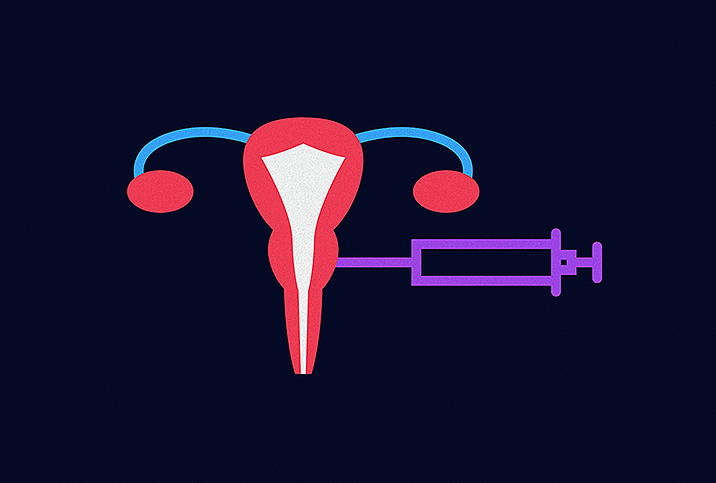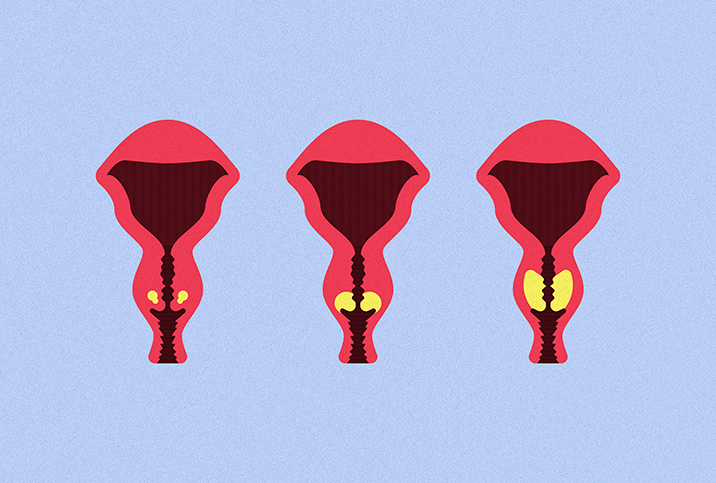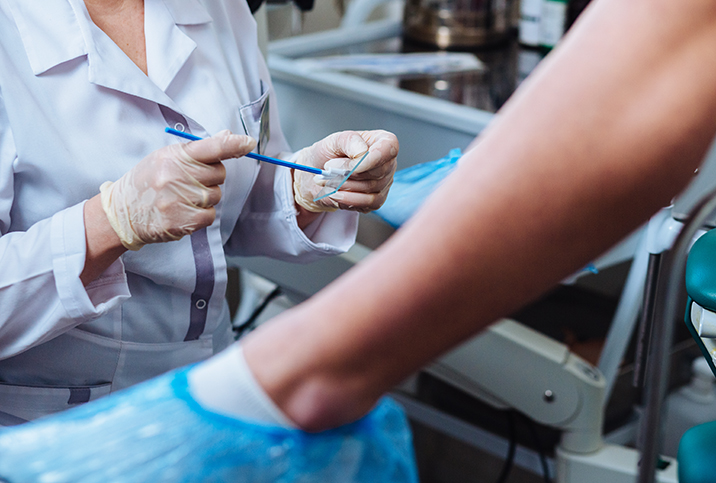Cervical Biopsy: What To Expect Before, During & After

The word biopsy is scary enough if cancer is involved. When it’s a cervical biopsy, a woman’s anxiety may exponentially ramp up. Here’s how to prepare and, hopefully, pave the way toward a better outcome.
The path to biopsy
A cervical cancer screening includes an HPV DNA test and often, at the same time, a Pap smear in which a doctor collects cells from the cervix to check for abnormal cell growth. Many cases of cervical cancer or precancer are caught during annual gynecological exams, often of women showing no symptoms, though some women may seek evaluation after experiencing specific symptoms: vaginal bleeding after sex, irregular menstrual bleeding, watery or bloody vaginal discharge, pelvic pain or pain during sex.
If cervical cancer is suspected, your doctor will perform a biopsy to obtain a larger sample of cells for analysis. The procedure—punch, cone or endocervical curettage (ECC)—depends on the size, shape and location of the problematic cells. If a diagnosis of cervical cancer is made, doctors will determine its stage. The next steps may include a thorough workup, including evaluation of the bladder and rectum through imaging, as well as a discussion of the treatment options.
What to know before a biopsy
While biopsies are routinely performed and are generally safe, they do include risks, such as infection and bleeding. Cone biopsies are associated with complications related to fertility, due to scarring or cervical incompetence, but these are rare and your doctor can explain your individual risks. Consider some steps to take to be best prepared.
Things to do (and not do) in advance of your cervical biopsy:
- Schedule your biopsy a week before your period to make it easier to obtain a good tissue sample.
- Make sure you receive and understand all pre- and post-procedure instructions from your OB-GYN and anesthesiologist (in the case of cone biopsies).
- Advise your doctor about any allergies (such as latex) or if you think you may be pregnant.
- Never hesitate to call your doctor(s) and clarify anything you do not understand, particularly pertaining to medications you are taking, as some could increase the risk of bleeding during the procedure.
- Ask about pain-management strategies pre- and post-procedure. Most patients are advised to take Tylenol (acetaminophen).
- Avoid having sex, using a tampon or applying any over-the-counter vaginal creams or cleaning products (e.g., douche) prior to the procedure.
Arrive for your biopsy prepared. It is advised to bring the following:
- A sanitary pad; some patients experience spotting after the procedure.
- A friend or family member for support and general safety—this will be required if you are receiving anesthesia—because some patients may feel discomfort afterward.
What to expect during the procedure
Before getting started, you’ll sign a consent form. Then you’ll lie on your back, similar to how you would for a regular pelvic exam. After numbing the area with a local anesthetic to minimize discomfort, your doctor will insert a speculum into your vagina, clean your cervix and remove tissue samples with a scalpel, forceps or a curette. Many patients describe the feeling as a pinching, pressure or a cramping sensation. Depending on the type of biopsy, your doctor may pack your cervix with material to reduce bleeding.
After the biopsy
Punch and ECC biopsies are performed as outpatient procedures, with most patients returning home the same day, a few hours after arrival. However, following a cone biopsy, which is performed under anesthesia, patients typically have a longer stay, with some remaining overnight. Make sure you know what type of procedure to expect by discussing it with your doctor beforehand.
Mild pain and cramping are common, but acetaminophen should help. Cramping and spotting can last for up to a week. Sex, heavy lifting and tampon use should be avoided for several weeks after a cone biopsy and possibly for one week after a punch biopsy or an ECC. Your doctor will walk you through instructions for aftercare and will contact you with biopsy results to explain the next steps. If you’re feeling anxious waiting, engage in relaxing activities such as meditation or yoga and schedule time with friends and loved ones.
In most cases, biopsies are quick and easy, and you’ll be back home in no time. In case you receive bad news afterward, stay positive: Women with stage 1 cervical cancer may have up to a 92 percent five-year survival rate.


















